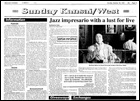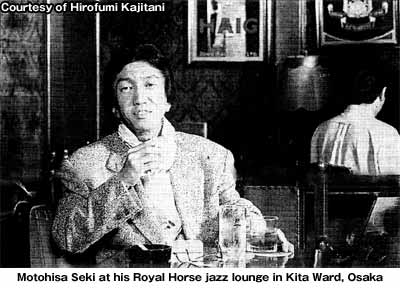 1994.Oct. By
Shoshun Tada (Daily Yomiuri Osaka Editor) 1994.Oct. By
Shoshun Tada (Daily Yomiuri Osaka Editor)
OSAKA ― The number of jazz live houses has been increasing
in Osaka in recent years. One such house, the jazz lounge Royal
Horse in Kita Ward, Osaka, celebrates
its 20th anniversary next year. It is one of the city's longest-established houses
offering live jazz performances.
 Motohisa Seki, 39, owner and producer of the Royal Horse, has become an influential
figure in the world of jazz producers in Osaka. Motohisa Seki, 39, owner and producer of the Royal Horse, has become an influential
figure in the world of jazz producers in Osaka.
"All I want to do is make the most of live sounds. Sounds are now even
made by computer, like those in TV commercials, and the aftertaste and depth
of live
sound have been lost" when created by computer Seki said.
Seki had first wanted to become a doctor, but ended up entering the economics
department of Konan University in Kobe in 1973. It took him six years to graduate
instead of the usual four. During his university days he studied for a year in
Hawaii, where he frequently listened to jazz on the radio.
His father was a shakuhachi player and his mother was a soprano vocalist.
As a child, Seki was brought up in a musical environment. He had developed
an unusual
yearning for jazz under the influence of his elder brother, but while he was
still a Konan University student, Seki's father pressed him to make a decision
about his future. So he decided to open a jazz restaurant in Osaka.
Seki found an office building located about five minutes from Japanese National
Railways (currently JR) Osaka Station. At first, the owner of the building
refused to house his restaurant in the building. As a result of negotiations
through
the landowner's son, who was his senior at Konan University, however, Seki
was finally allowed to open his jazz restaurant.
Because his uncle was riding hoses and because the Royal Hotel was in Osaka,
Seki named his restaurant the "Royal Horse."
Seki opened the Royal Horse in June 1975 when he was still a 20-year-old university
student.
Customers formed a queue in front of the restaurant every day. Before attaining
her fame and fortune, singer Yasuko Agawa appeared on the stage of the Royal
Horse for \70,000 a day, though she is said to earn \2 million a day now.
 Probably because he somewhat lacked a business sense in those days, Seki ran
up a loss of \40 million during the first two years of operating his restaurant.
But bassist Mitsuru Nishiyama strongly supported Seki during this period and
for a long time after that. Probably because he somewhat lacked a business sense in those days, Seki ran
up a loss of \40 million during the first two years of operating his restaurant.
But bassist Mitsuru Nishiyama strongly supported Seki during this period and
for a long time after that.
Seki then succeeded in bringing one first-rate player after another onto the
small Royal Horse stage by directly talking to them in their dressing rooms.
They included pianist Herbie Hancock, drummer Art Blakey, pianist Bill Evans,
alto saxophonist Art Pepper and vocalist Anita O'Day.
Recent artists performing at the Royal Horse have include trumpeters Louis
Johnson, Terumasa Hino and Maynard Ferguson.
"In Tokyo, they (live jazz restaurant operators) make a point of making
profits, "Seki said. "Osaka people love jazz. So I believe I must
side with the public and produce jazz performances so they will enjoy jazz.
I'm satisfied
only if I can earn my living."
In fact, Seki holds two or three auditions a year to develop jazz singers. "If
you think you are practicing music by singing to a karaoke machine, you don't
even understand the basics," Seki said.
Seki, who has nurtured pianist Kiyoshi Takeshita, has made friends in many
parts of the world through jazz.
To the signboard of his restaurant, Seki recently added the slogan "N.Y.
Sound Live." He said, "Thanks to the yen's appreciation against the
dollar, we can now invite New York jazz musicians."
Osaka has changed that much. As for himself, Seki will continue trying out
something new in search of the depths of jazz.
|

 Motohisa Seki, 39, owner and producer of the Royal Horse, has become an influential
figure in the world of jazz producers in Osaka.
Motohisa Seki, 39, owner and producer of the Royal Horse, has become an influential
figure in the world of jazz producers in Osaka. Probably because he somewhat lacked a business sense in those days, Seki ran
up a loss of \40 million during the first two years of operating his restaurant.
But bassist Mitsuru Nishiyama strongly supported Seki during this period and
for a long time after that.
Probably because he somewhat lacked a business sense in those days, Seki ran
up a loss of \40 million during the first two years of operating his restaurant.
But bassist Mitsuru Nishiyama strongly supported Seki during this period and
for a long time after that.